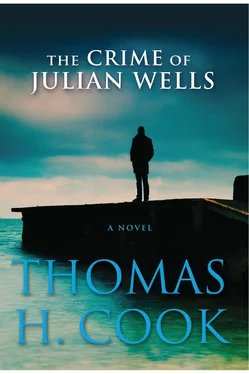Thomas Cook - The Crime of Julian Wells
Здесь есть возможность читать онлайн «Thomas Cook - The Crime of Julian Wells» весь текст электронной книги совершенно бесплатно (целиком полную версию без сокращений). В некоторых случаях можно слушать аудио, скачать через торрент в формате fb2 и присутствует краткое содержание. Год выпуска: 2012, ISBN: 2012, Издательство: Grove Press, Жанр: Криминальный детектив, на английском языке. Описание произведения, (предисловие) а так же отзывы посетителей доступны на портале библиотеки ЛибКат.
- Название:The Crime of Julian Wells
- Автор:
- Издательство:Grove Press
- Жанр:
- Год:2012
- ISBN:9780802194589
- Рейтинг книги:5 / 5. Голосов: 1
-
Избранное:Добавить в избранное
- Отзывы:
-
Ваша оценка:
- 100
- 1
- 2
- 3
- 4
- 5
The Crime of Julian Wells: краткое содержание, описание и аннотация
Предлагаем к чтению аннотацию, описание, краткое содержание или предисловие (зависит от того, что написал сам автор книги «The Crime of Julian Wells»). Если вы не нашли необходимую информацию о книге — напишите в комментариях, мы постараемся отыскать её.
The Crime of Julian Wells — читать онлайн бесплатно полную книгу (весь текст) целиком
Ниже представлен текст книги, разбитый по страницам. Система сохранения места последней прочитанной страницы, позволяет с удобством читать онлайн бесплатно книгу «The Crime of Julian Wells», без необходимости каждый раз заново искать на чём Вы остановились. Поставьте закладку, и сможете в любой момент перейти на страницу, на которой закончили чтение.
Интервал:
Закладка:
Then her eyes abruptly brightened and she was our professional guide again.
“You must have a taste of Argentina,” she said. “Of our wine. It is called Malbec, and the difference in taste between the cheap and the not cheap, it is not so big.” She smiled softly, but it seemed an actress’s smile. “You will like it, I think. But just in case, you should order the cheap one.”
Only once more during that day did Marisol again leave her role as cheerful, uncomplicated guide. It was in answer to Julian’s question about her feelings concerning the current state of Argentina, then in the final throes of its Dirty War.
In response, Marisol’s gaze grew tense. “Here we say that Argentina es un pais perdido,” she said softly. “A lost country.” She shrugged. “And we have another saying. A funny answer when we are asked how we are doing.” She glanced about to make sure she could not be heard, then whispered, “ Jodido pero contento. ”
“What does that mean?” I asked.
She was suddenly hesitant. “I do not wish to be vulgar.”
“Oh, come on, Marisol,” Julian said. “We’re all adults here.”
“Okay,” she said, then laughed. “It means ‘screwed but happy.’”
We parted at around nine that evening, then met again the next morning, mostly for a tour of various museums, during which Marisol was very much the professional guide, talking of this artist or that one in the fashion of a museum brochure. There were also walks along the canals, a visit to Teatro Colon, Buenos Aires’s famed opera house. Our third day involved a ferry to Montevideo followed by a boat ride to the estuary where the Germans had scuttled the Graf Spee in December of 1939. Marisol was surprisingly knowledgeable and knew the exact coordinates beneath which the doomed vessel lay.
“The English tourists like to come here,” she told Julian by way of explanation. “Sometimes the Germans, too. So I discovered where it is and we are now exactly at this place.” She smiled brightly. “Knowing such a thing makes me a better guide, no?”
On the fourth day Marisol took us to the cemetery in Recoleta.
“This is a very quiet place,” Marisol said as she led us beneath the dazzlingly white arched entrance.
For a time we wandered silently among the mausoleums, moving slowly, but without a stop, until we reached Evita’s tomb.
“Eva Peron was a poor girl,” Marisol said softly when we paused before it. “Just another poor girl from Los Toldos.”
“Would you have voted for her?” Julian asked.
Marisol shrugged. “Now there is no voting here,” she said. “It is only between two bad things that we must choose.” She peered at the small plaque attached to the tomb. “Sometimes, when I bring the people here, I tell them what Borges said about life,” she went on. “This adds to me as a guide.”
“What did Borges say?” Julian asked.
Marisol, honest to the quick, said, “The English, it is not my translation.”
“Still, I’d like to hear it,” Julian insisted.
Marisol summoned this translation that was not hers, then said, “Okay, Borges said: ‘Our time on earth is divvied out like stolen things: a booty of nights and days.’”
Her eyes darkened slightly, and then, as if by an act of will, they brightened again, though this time something behind them remained in shadow. “Come,” she said. Then, very quickly, she turned and headed out among the tombs. “Come,” she repeated as she waved us forward. “A guide should be always smiling.”
She had only contracted for a set number of hours each day, but she went off the clock at six that evening, so we remained in the restaurant for a long time. We had dinner, then strolled along Calle Florida for a time, where we stopped to watch a couple of street performers dance the tango.
Marisol watched them for a little while, and during that interval I noticed her mood descending. “I do not like the tango,” she said as she turned and led us away from the dancers. “The man rushes forward. The woman pushes him away, then turns her back to him. The man rushes to her again and jerks her around with violence. It is disturbing to me, this dance. It is not romantic. It is-what is the English word? — prelude. Yes, it is the prelude to a beating.”
We returned to the hotel at around eight in the evening. I was tired, but Julian was full of energy, so we went to the lounge for a nightcap, where he talked of nothing but Marisol. He had seldom traveled since his father’s death, and I could see that her foreignness appealed to him: the fact that she was bilingual, which he was not, and perhaps even her indigenous facial features.
“Do you suppose she really isn’t political?” he asked. “That business of having only two bad things to choose from?”
“That’s what she said.”
“But coming from that poor background, she must hate the junta,” Julian said.
“Yes, but maybe she’s one of those people who look within themselves for a way out of oppression,” I told him. “That’s why they get on boats and sail to new worlds.”
Julian hesitated briefly, then said, “If someone like Marisol doesn’t have a fighting chance, then something’s very wrong, Philip.”
I smiled. “You’ll fix that when you’re secretary of state,” I assured him.
I’d meant this only half jokingly for at that moment it seemed quite possible.
“That’s not for me,” Julian said. “It’s all politics. Your father knows that. He’s had plenty of experience with it. You want to do good, but the policy is evil, and you must serve the policy.”
“What then?” I asked. “You have to do something with your life.”
“Something behind the scenes, I guess,” Julian said. “The secret gears.”
“The secret gears?” I asked, rather amused by how vague, yet adventurous it seemed. “You mean dark alleys and notes slipped into drop boxes? That’s the work of spies, Julian.”
“I suppose it is,” Julian said. “But it would be better than an office at Foggy Bottom.”
“It would also be more dangerous,” I reminded him.
“More dangerous, yes,” Julian agreed. “But only for me.”
And with that, he laughed.
9
“Laughed?” Loretta asked when I told her this.
It was the day I was to leave for Paris, and she’d insisted on taking me to the airport. She’d arrived late in the afternoon, dressed in a dark green pants suit and looking so surprisingly rested that I’d have sworn she’d spent time in a spa.
“Laughed, yes,” I told her. “So I didn’t take him seriously.”
She was seated by the window, the park to her back, the light quite bright, so that she was half in silhouette. “Julian would have made a good spy,” she said. “That’s clear from his books, how good he was at integrating information, making connections, seeing the big picture.”
“That’s true,” I said. “He did that in The Eyes of Oradour . In one passage you’re not even in France. He takes you to the sarcophagi of Cozumel, describes how small the people of that island were, and from there to how small all the Indians of South America must have seemed to the likes of Cortes and Pizarro.”
“It’s a great skill, putting such details together,” Loretta said. “And of course the clandestine part of it would have appealed to Julian when he was a young man, the secret devices.”
Like one seated in a dark movie house, I unexpectedly imagined Julian as precisely that, a figure in a rainy alleyway, dressed in a trench coat, the brim of his hat pulled low, smoking a Gauloise as he waited for his beautiful female contact.
No, that would not have been it, I thought.
Читать дальшеИнтервал:
Закладка:
Похожие книги на «The Crime of Julian Wells»
Представляем Вашему вниманию похожие книги на «The Crime of Julian Wells» списком для выбора. Мы отобрали схожую по названию и смыслу литературу в надежде предоставить читателям больше вариантов отыскать новые, интересные, ещё непрочитанные произведения.
Обсуждение, отзывы о книге «The Crime of Julian Wells» и просто собственные мнения читателей. Оставьте ваши комментарии, напишите, что Вы думаете о произведении, его смысле или главных героях. Укажите что конкретно понравилось, а что нет, и почему Вы так считаете.












